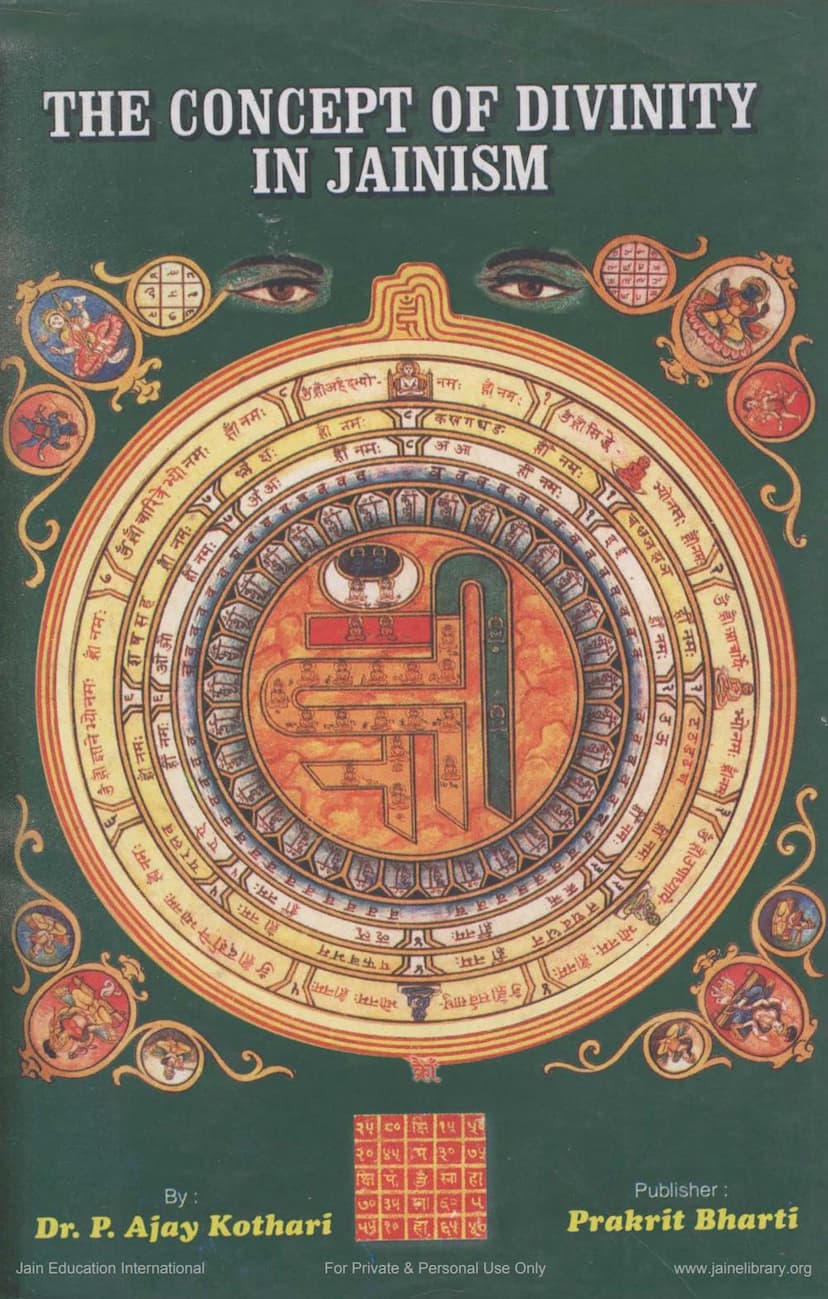Concept Of Divinity In Jainism
Added to library: September 1, 2025

Summary
This comprehensive summary draws from the provided pages of "The Concept of Divinity in Jainism" by Dr. P. Ajay Kothari.
Core Argument and Scope:
The book, a doctoral thesis, delves into the concept of divinity across various religions, with a particular focus on Jainism. Dr. Kothari argues that while many religions equate divinity with a creator God, Jainism presents a unique perspective. Instead of a creator deity, Jainism emphasizes divinity as an attainable state of perfection by the individual soul through self-discipline and adherence to Jain principles. The work offers a comparative study, exploring divinity in Hinduism, Buddhism, Sikhism, Zoroastrianism, Christianity, and Islam before dedicating significant attention to the Jain understanding.
Key Themes and Concepts:
- Rejection of a Creator God in Jainism: Unlike Abrahamic religions and many Hindu traditions, Jainism does not believe in a God who creates, sustains, or destroys the universe. The universe is considered eternal and self-regulated, composed of six eternal substances (dravyas): soul (jiva), matter (pudgala), motion (dharmastikaya), rest (adharmastikaya), space (akashastikaya), and time (kala).
- Divinity as an Attainable State (Godhood): The central tenet of Jain divinity is that every soul (jiva) is inherently pure and divine. Through spiritual practice, the soul can shed the obscuring karmic matter and realize its inherent divine nature, becoming an omniscient, omnipotent, and blissful being (Paramatma or Siddha). This is referred to as "Uttaravada" (ascendance of man to Godhood) as opposed to "Avataravada" (descent of God).
- The Role of Karma: Karma is central to the Jain understanding of the soul's journey. Karmic particles, subtle and material in nature, attach to the soul due to passions (kashayas), ignorance, and attachment/aversion. This bondage obscures the soul's pure and divine nature. The process of spiritual development involves Samvara (stoppage of karma inflow) and Nirjara (shedding of accumulated karma) to achieve liberation (Moksha).
- The Five Parameshtis: Jainism reveres five supreme spiritual entities, the Pancha Parameshtis, who represent the stages of spiritual attainment. These are:
- Arihanta (Arhat): The omniscient beings who have destroyed the four "ghati karmas" (knowledge-obscuring, perception-obscuring, delusion-inducing, and power-hindering) and possess infinite knowledge, perception, bliss, and power, while still embodied. They are the Tirthankaras who propagate the Jain path.
- Siddha: The perfectly liberated souls who have destroyed all eight karmas, are free from the cycle of birth and death, and reside in their pure, divine state of eternal bliss at the summit of the universe. They are the ultimate manifestation of divinity.
- Acharya: The heads of the Jain monastic order, who observe strict conduct and guide others.
- Upadhyaya: Teachers who expound Jain scriptures and guide meditation.
- Sadhu: Ascetics who practice renunciation and austerities for their own spiritual liberation. While Arihantas and Siddhas are considered supreme divinities, the latter three are revered as exemplars and guides on the path to divinity.
- The Path to Divinity (Gunasthana): Jainism outlines a clear path of spiritual development through fourteen stages known as Gunasthana. These stages represent a progressive shedding of karmic impurities and a refinement of the soul's inherent qualities, leading ultimately to liberation and divinity. The stages involve cultivating right faith, right knowledge, and right conduct.
- The Nature of Divinity: The divine in Jainism is characterized by infinite knowledge (ananta jnana), infinite perception (ananta darshana), infinite bliss (ananta sukha), and infinite power (ananta virya). The liberated soul retains its individuality and these infinite attributes, existing as a pure, formless, and eternal entity. It is not a creator or controller of the universe.
- Atheism vs. Jainism: The book addresses the misconception that Jainism is atheistic. While it rejects a creator God, it firmly believes in the divinity of the soul and the possibility of realizing this divinity. The focus is on self-effort and adherence to principles, not on divine intervention or grace.
- Comparative Analysis: Dr. Kothari systematically compares the Jain concept of divinity with that of other religions. He highlights that while Hinduism often involves a pantheon of gods and the concept of a creator deity, and Buddhism focuses on achieving Nirvana (a state of liberation from suffering), Jainism's emphasis on the inherent divinity of every soul and its path to perfection through self-effort is unique. The book details the different religious traditions' approaches to divinity, from polytheism and monotheism to non-theistic paths.
Author's Contribution:
Dr. Kothari's work is praised for its thorough research, clear exposition, and comparative analysis. It brings to light the often-neglected contributions of Jainism to the broader understanding of divinity in world religions. The book serves as a valuable resource for scholars and general readers interested in religious philosophy and comparative studies. The forewords and opinions by esteemed scholars like Dr. M.R. Gelra, Dr. Mukund Lath, Prof. Jayendra Soni, and others underscore the significance and quality of this academic endeavor.